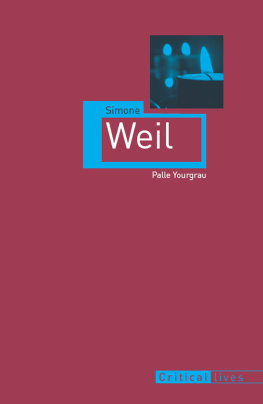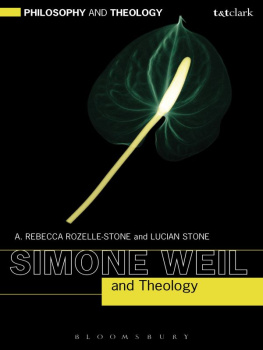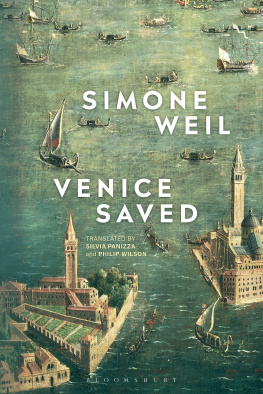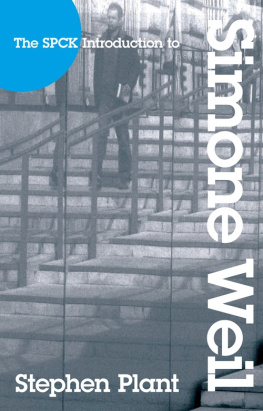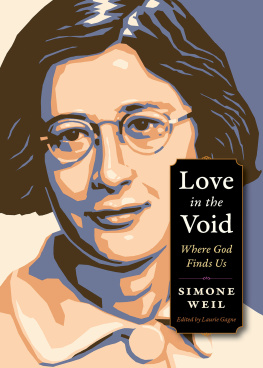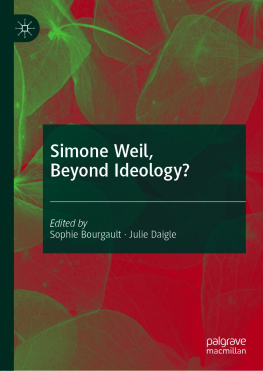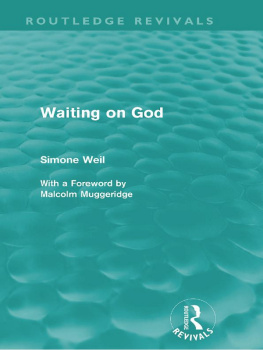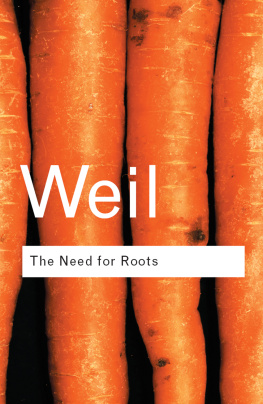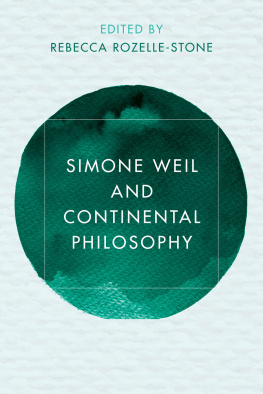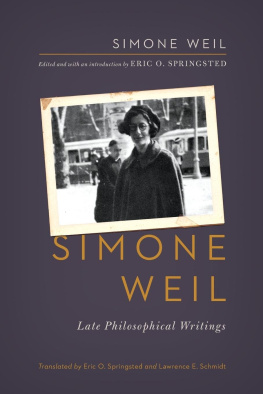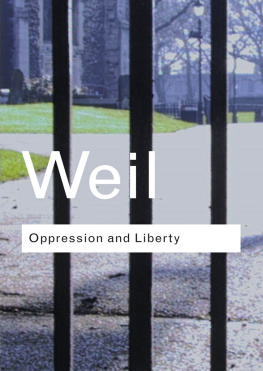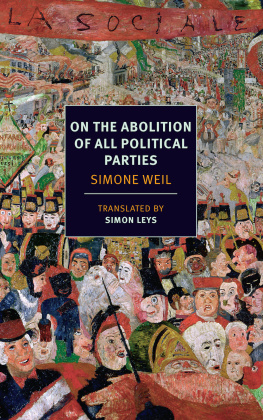Simone Weil. (Critical lives)
1. Weil, Simone, 19091943
2. Women philosophers France Biography
3. Philosophers France Biography
I. Title II. Series
Introduction
To us a single act of injustice cheating in business, exploitation of the poor is slight; to the prophet, a disaster. To us, injustice is injurious to the welfare of the people; to the prophet, it is a deathblow to existence; to us, an episode; to them, a catastrophe, a threat to the world. Abraham Heschel, The Prophets
More than once it happened: I denied Simone. (Il mest arriv plus dune fois de renier Simone.) Thus does Sylvie Weil, Simones niece, born a year before her aunts death, open her remarkable memoir, Chez les Weil: Andr et Simone. The power to stand by what is truly good, what does not belong to this world, does not come from within. To believe it does is a form of arrogance, a betrayal in itself of what one claims to love. It is Simone herself, thus, who has relieved her niece of St Peters burden. Yet the question remains: why was Sylvie Weil moved to deny her famous aunt who had already, preemptively, absolved her?
Simone Weil, legendary French philosopher and mystic, died in 1943 in London at the age of 34, having forged in the brief span of her life a Platonic reconstruction of Christianity a bridge between human suffering and divine perfection. The bridges of the Greeks, wrote Weil,... we... do not know how to use them. We thought he devoted one to The Importance of Simone Weil. She has become, it is safe to say, a cult figure, a kind of modern saint, and yet at the same time a bte noire, a Jew accused of having abandoned her own people in their hour of greatest need. Having disowned her own, it was Simones turn to be disowned by her own niece. Thus, a challenge: who is the real Simone Weil?
What is needed is not more history. Excellent biographies already exist, from the first and still classic by Jacques Cabaud, The present study is not intended to add to this historical narrative. The pages of Simone Weils life have been reshuffled enough in an attempt to reproduce faithfully her lifes journey. What is needed now is an arrangement that convinces not by an attempt to approximate the original, but rather by a bold leap to get behind or beyond the surface, the veneer that blinds us by its familiarity.
We must attempt to imitate what Weil calls the artist of the very first order, who works after a transcendent model which he
Nevertheless, a dramatic life Weils certainly was at once a tragedy and a comedy, as Flannery OConnor has said a journey without repose. Sleeping may be good for the body, but it is death for the soul. [T]he soul is asleep, says Weil. If it wakes up for an instant, it then turns itself toward the legitimate form of union [with the divine]. And it could well be said that Simone Weil was born to die. How often did she not recall her beloved Plato, whose Socrates claims in the Phaedo, to the alarm of all around him, that philosophy itself is but the cultivation of dying?
Weils own life was bracketed by the two landmarks of death that George Steiner has aptly noted define the twentieth century: with the sickness of soul that led to Fascism more generally, with the degeneration of spirit that runs like a straight line from God and country to the death camps of National Socialism.
A similar journey was undertaken by the Austrian philosopher Karl Popper who, like Weil, devoted much of his youth to a critical study of Marxism but with a different destination. It is Plato himself, Popper argued in his monumental The Open Society and its Enemies,
The proposal during the very years the Holocaust was taking place to rethink the heritage of ancient Israel has provoked,
Weils rethinking of Christianity, in contrast, has engendered an extraordinary warmth of sentiment among true believers, for whom Simone, though never officially a Catholic, counts unofficially as a saint though she could just as easily be compared with the ancient Hebrew prophets, for whom the smallest human injustice threatens the very foundation of the universe. The attempt to honour her with sainthood, however, would have been lost on Weil herself. I dont want you to do me the injustice, she wrote to a friend, of imagining that I affect saintliness. I do not, she went on, like the way in which Christians today speak about saintliness... [I]t seems to me that saintliness is, if I dare say so, the minimum for a Christian. It is for a Christian what financial probity is for a merchant. Of course, she added, there exist in fact dishonest merchants... and people who have chosen to love Christ but who are infinitely below the level of sanctity. Of course, I am one of them.
The suggestion that Weil be sanctified amounts in some quarters to a form of idolatry i.e. the exact movement of the soul to which
This hagiography of Simone has also provided a convenient excuse not to take her ideas seriously, a tendency of which she herself took note. Simone Weils intelligence... [was] borne out by her writings is how Emmanuel Levinas begins his essay on Weil. What follows, however, can only be described as a dismissal, as one might swat an annoying fly even if that fly turns out to be, in Levinas words, a saint and a genius. And in fact, as saint or genius, Weil, for all her cult status, continues to remain outside the groves of academe. As the centenary of her birth in 1909 came to pass, a striking movie about her life was in production, an experimental documentary entitled

